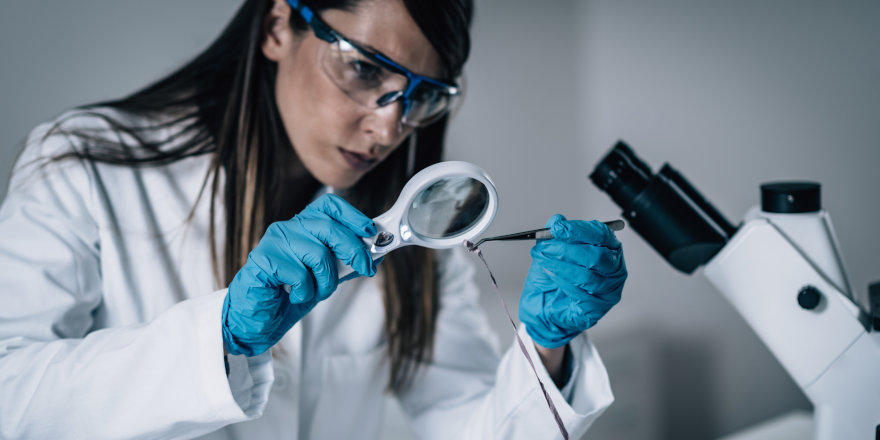
Are you fascinated by forensics? Does the idea of an interdisciplinary field, drawing from the natural and social sciences, excite you? Would you enjoy solving mysteries and helping people as part of your career?
If so, consider becoming a forensic scientist. There are lots of programs in Canada that will teach you everything you need to know about analyzing evidence to help solve crimes. Discover what it takes to become a forensic scientist!
What is a forensic scientist?
Forensic science is the application of science to law. So, a forensic scientist uses scientific methods and processes to help solve crimes. Although the forensic scientists we see on television and in movies perform many roles and always seem to be in the action as they catch bad guys, this career in real life is pretty different. You can specialize in many different areas in this field which will determine your career path:
Forensic anthropology — the examination of human skeletal remains
Forensic DNA analysis — determining a DNA profile for legal and investigative purposes
Forensic toxicology — the analysis of biological samples for the presence of toxins, drugs, or chemicals
Digital forensics — the process of uncovering and interpreting electronic data
And many more!
What do forensic scientists do?
While there are many different categories of forensic scientists, there are some common responsibilities they must perform. Forensic scientists typically collect evidence from crime scenes, perform tests on the evidence and interpret results, and potentially testify in court using their expert opinion.
How to become a forensic scientist in three easy steps:
Discover how you can become a forensic scientist in only three simple steps:
Step one: Education
The first step to becoming a forensic scientist is to get the right education. Forensic scientists typically have a minimum of a four-year bachelor’s degree in science or forensic science. There are many post-secondary schools that offer forensic science degrees, like:
In a forensic science program, you’ll learn the foundational science of forensics and take courses that’ll directly help you in your career as a forensic scientist, such as crime scene investigation, bloodstain pattern analysis, toxicology, forensic DNA typing, and more! Alternatively, you can get a bachelor’s science degree and study a specific science, like toxicology, pharmacology, biology, etc., and develop deeper insight in that one field.
Keep in mind that advanced specializations of forensic science (eg. forensic limnology) may require further education or more experience in the field.
Step two: Narrow down your specialization
There are different types of forensic scientists, so you’ll need to select a specialization to help you narrow down your career path. Are you interested in the way the mind works? Then you should consider forensic psychology! Do you find insects interesting? Then consider a career in forensic entomology! There are plenty of options for you to specialize in, so you’ll likely find one that interests you.
Some undergraduate programs, like Ontario Tech’s Forensic Science program, will require you to choose a specialization in your program. Then you’ll begin to cater your courses or field experience to that specialization.
Step three: Gain experience
Many employers will want someone with experience, and there are a few ways you can get it. You could work at your local police station, with the RCMP, or in hospitals and laboratories. However, if you choose a forensic science degree, you may also have access to a co-op or field placement where you’ll gain valuable experience working alongside experts and professionals in the field.
Some schools even have state-of-the-art buildings where students can get practical experience in mock crime scenes like Ontario Tech’s Crime Scene House or Trent’s Forensic Crime Scene Facility.
If mock crime scenes sound fun to you, check out Trent’s Forensic Crime Scene Facility:
Career prospects
So, knowing that there are plenty of different directions you can choose as a forensic scientist, what interests you? Some titles you could hold are:
- Toxicologist
- Forensic pathologist
- DNA analyst
- Crime scene technician
- Forensic biologist
This is just a sample of the types of careers you could pursue, but the choice is up to you! To get a better idea of what you can expect when you graduate, forensic scientists on average make approximately $70,800, and currently there are more people looking for forensic scientist jobs than there are jobs available.
So, if you’ve got an interest in solving crime, you can explore the world of forensic science and discover your passion. What will you choose to specialize in?
Get started on your forensic science degree today